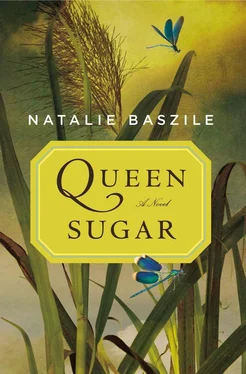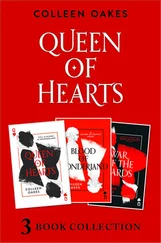Charley stepped out of her car and leaned against the hood. Soon, the door swung open, piano music wafted out to the street, and a handful of people streamed onto the sidewalk trailed by Violet, stunning in her bright yellow dress and hat like a Victorian lampshade.
“Oh, my Lord, would you look who’s here.” Violet strode over to Charley and seized her hand. “What’s going on? I can tell by your face this isn’t a social call.”
Charley leaned forward and buried her face in her hands. She told Violet about deciding to auction off The Cane Cutter , about writing Denton her last check, about her blow-up with Miss Honey.
“I can’t work with him,” Charley said. “I know he’s my brother, but he’s—”
“Combative? Erratic? Manipulative? Has an inflated sense of his own worth?”
“I’ll take door D, Monty, all of the above,” said Charley. “She wants me to give him a share of the farm, but she doesn’t understand I’m not allowed to. Either it’s mine or it goes to charity. Some legal thing.”
“So you get to support Ralph Angel while he works. Or, more likely, doesn’t.”
Charley’s eyes filled. “Yes. And Miss Honey is angry. She quoted a lot of scripture. I think she put a hex on the farm.”
“Girl, Mother always quotes scripture. She’d quote scripture in front of the Supreme Court if she thought it would help her win her case.”
“Yeah, but she quoted that passage about being your brother’s keeper. That last part about being a vagabond on the land was creepy.”
“Hmmm.” Violet went quiet for a moment, and Charley could practically see her scanning the biblical reference book she had in her head — it was the same edition Ralph Angel owned. Her lips moved as though she were reading to herself, her soft mumbling growing steadily louder. “‘A fugitive and a vagabond shalt thou be in the earth,’” Violet said. “Oh. I see what you mean. Most people leave out that last part.” She nodded, reverentially. “Mother’s good.”
“So I’m cursed?”
“Who can say for sure? This is Louisiana.”
“Violet, you’re not helping.”
“I’m sorry, darling, but this one has me stumped. I have to say, I don’t envy you.” Violet gave her arm an encouraging pat. “Don’t worry. You’ve managed to get this far, you’ll figure something out. I have faith in you.”
Just before Charley pulled away, she had a thought and rolled down her window. “How come you don’t have a Blessing of the Crops service here?” she said. “Because if you did, I promise I’d come.” She gazed again at Violet’s church with its hand-painted sign and poster board taped to the door. Violet looked up and down the street and sighed. “’Cause none of our members own any crops to bless, I suppose.”
• • •
Mr. Guidry’s tiny shack was tucked far back in the woods, back beyond the dam where the local high school kids smoked pot and blasted the Black Crows from their car stereos, past the POSTED sign and the little lake covered with a thick quilt of algae, and standing on Mr. Guidry’s creaky porch where every other cypress board was missing, Charley thought only a fool would venture this far back in the woods by herself with no invitation and no idea what to expect. How she’d found Mr. Guidry’s still confounded her, but she had, just where Violet said it would be. “This is going to sound crazy,” Violet had called to say, not long after Charley got home from her church, “but, there’s an old man, a traiteur. ”
“What do you mean, a traiteur ?”
“A healer.”
“As in voodoo ?” Charley had held the phone away from her ear. “You’re right. You do sound crazy. I’m desperate, Violet, but I’m not that desperate.”
“Now, hold on. Just hear me out before you say no. It’s not voodoo. Traiteurs do good things like heal snakebites and get rid of warts and cure colicky babies, but they do other things too. Mother used to go to Mr. Guidry. Swore by him. I don’t even know if he’s still alive, but it’s worth a try.”
Now Charley knocked on Mr. Guidry’s door — just one knock — and when he answered, she stood facing a blackberry-colored, rheumy-eyed man no taller than Micah, and older, it seemed, than time. Charley almost turned and ran. But Mr. Guidry invited her in as though he’d been expecting her, and before she knew it, she found herself sitting on an old wooden stool in a corner of his one-room cabin.
“You’re a Bordelon,” Mr. Guidry said. “I remember your daddy.” He was soft-spoken and frail, but moved about the cabin with relative ease. Charley watched as he pulled herbs and feathers, dried chicken feet and scraps of leather from dusty bottles on the shelf beneath his window.
“You knew my dad?”
Mr. Guidry nodded. “Long time ago.”
He laid all the objects on the table, then rubbed each of them while he muttered an incantation, and when he finished, he touched his hand to Charley’s forehead. What she felt was something between falling and flying. She wasn’t sure when he removed his fingers, but when she opened her eyes, he presented her with a necklace — just a piece of string, really, with nine equally spaced knots — which she let him tie around her neck. Violet said he’d refuse to take any money and would even consider a thank-you unnecessary, so Charley shook his hand and offered him the fig cake she’d baked. She was already through the woods when she realized he’d never asked her why she’d come — he seemed to know — and that she’d forgotten to ask what he’d done for her father.
Standing under a sky that had yet to break, Charley marveled at how different the air smelled. Mixed in with the usual mildew and damp earth was a carbony sweetness, and Charley knew that from this day forward she would always associate mid-October with the smell of burnt sugar. She took a final swig of coffee, dumped the rest in the bushes, screwed her thermos cap on tight, and crossed Miss Honey’s yard, her breath pluming in a small cloud of white vapor, the frost on the grass crunching under her boots. In the car, she turned on the radio. And the heater. Mornings were cold now, and while the car warmed up, Charley listened to the first few minutes of Morning Edition . Sluggish economic growth, congressional logjams, unrest in the Middle East. Nothing ever changed.
Two minutes later, the car was toasty. Charley honked, then honked again, and was about to get out, when Ralph Angel tripped down the front steps carrying his shoes.
“Sorry,” he said, sheepishly, sliding into the passenger seat. “I was looking for my gloves.”
Charley threw the car into drive. “Let’s just go.”
• • •
By the time they reached the drawbridge, night was peeling away from the horizon, amethyst and plum replaced by a rising line of tangerine light. Fog swirled across the asphalt. The bayou was the blue-gray of a Confederate coat.
Ralph Angel rode in silence, which was fine with Charley. He looked out the window and picked at a blister on his hand. But every once in a while, he seemed to hear something on the radio that troubled him and he stared at the dashboard as though the announcer had insulted him personally.
“You’ll be on Romero’s crew,” Charley said, not because she wanted to talk, but because once they got to the fields, there wouldn’t be time to explain.
Ralph Angel looked over at her.
“His men work fast,” Charley continued. “It’ll be hard to keep up.”
“Gotcha.”
“And you’ll want to keep your jacket on all day, even when it gets warmer. Those cane leaves will slice you up if you’re not careful.”
Читать дальше












